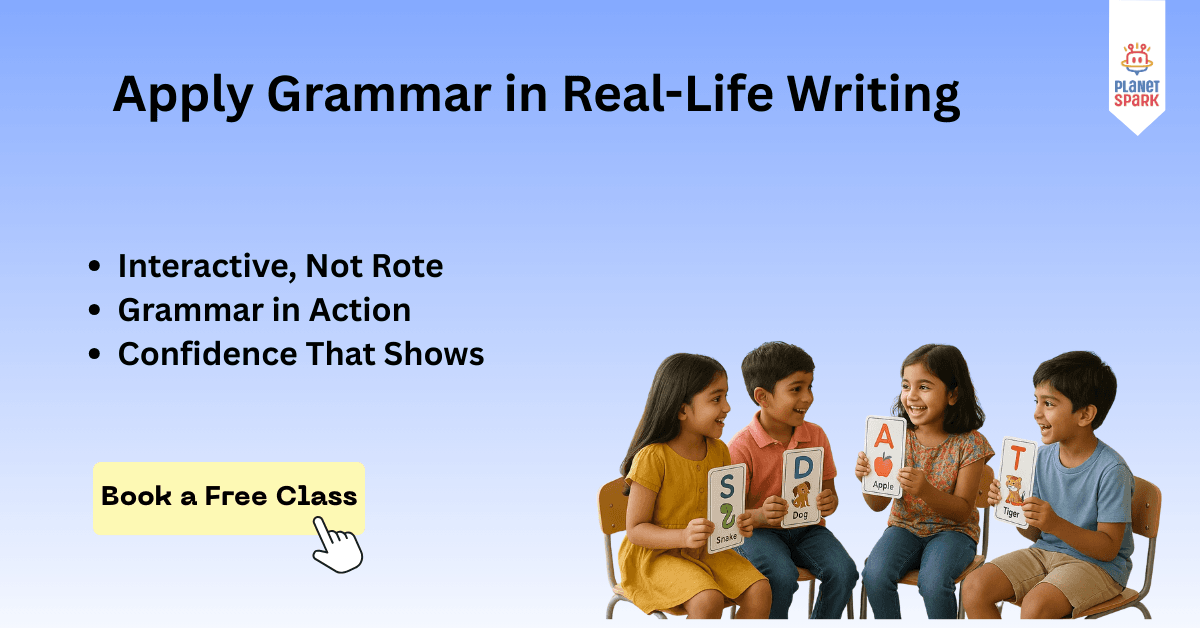Modal Verbs in English Grammar: Definition and Examples

Table of Contents
- What is a Modal Verb?
- List of Modal Verbs in English
- Modal Verbs Meaning and Usage
- Semi Modal Verbs
- Modal Auxiliary Verbs with Examples
- Difference Between Modal Verbs and Auxiliary Verbs
- Modal Verbs in English Sentences
- Modal Verbs Worksheet for Practice
- Modal Verbs Exercises
- Importance of Modal Verbs in English Communication
- Common Mistakes with Modal Verbs
- Modal Verbs Chart (Quick Reference)
- Modal Verbs in Different Tenses
- Modal Verbs in Formal vs Informal English
- Modal Verbs in Spoken English
- Common Modal Verb Combinations
- PlanetSpark Grammar Course: Learn Modal Verbs the Fun Way
- Frequently Asked Questions (FAQs)
Modal verbs are an essential part of English grammar. They are special auxiliary verbs that express possibility, necessity, ability, obligation, or permission. In this blog, we will explore modal verbs in detail, their meaning, list, examples, usage, and provide worksheets and exercises for better understanding. Whether you are a student, parent, or English learner, this complete guide will help you master modal auxiliary verbs step by step.
What is a Modal Verb?
A modal verb is a type of auxiliary (helping) verb that expresses the speaker’s attitude or mood toward an action. Unlike regular verbs, modal verbs do not change their form according to tense or subject.
Examples:
She can swim fast.
You must complete your homework.
We should respect our teachers.

Key Features of Modal Verbs
Do not take “-s” in the third person singular (He can, not He cans).
Do not use “to” before another verb (She can sing, not She can to sing).
Express possibility, obligation, necessity, ability, permission, or advice.
List of Modal Verbs in English
Here is the modal verbs list commonly used in English:
Can
Could
May
Might
Must
Shall
Should
Will
Would
Each of these has a special function and meaning in communication.
Want your child to master grammar with ease?
Modal Verbs Meaning and Usage
Let us understand the modal verbs meaning with examples:
1. Can
Expresses ability or permission.
Example: She can ride a bicycle.
2. Could
Expresses past ability or polite request.
Example: I could read when I was four.
3. May
Expresses permission or possibility.
Example: You may leave now.
4. Might
Expresses possibility (weaker than “may”).
Example: It might rain tomorrow.
5. Must
Expresses strong obligation or necessity.
Example: You must wear a helmet.
6. Shall
Expresses intention or determination (formal use).
Example: We shall overcome.
7. Should
Expresses advice, expectation, or mild obligation.
Example: You should eat healthy food.
8. Will
Expresses future certainty or willingness.
Example: I will call you later.
9. Would
Expresses hypothetical situations or polite requests.
Example: I would like some coffee.
Give your child the gift of confident English communication.
Semi Modal Verbs
Apart from core modal verbs, English also has semi modal verbs. These are verbs that behave partly like modal verbs but follow normal verb rules.
Common Semi Modal Verbs
Ought to
Need to
Dare
Used to
Examples:
You ought to be kind to others.
She needs to work hard.
Modal Auxiliary Verbs with Examples
Since modal verbs are auxiliary verbs, they always support the main verb. Let’s see some detailed modal auxiliary verbs examples:
He can play the guitar.
We must study regularly.
They might visit us tomorrow.
You should practice speaking daily.
Notice that the modal verb is followed by the base form of the main verb.
Difference Between Modal Verbs and Auxiliary Verbs
Auxiliary verbs: Be, Have, Do (used to form tenses, questions, and negatives).
Modal auxiliary verbs: Can, May, Must, Should (used to express mood, possibility, or necessity).
Example:
Auxiliary: She is reading a book.
Modal: She can read very fast.

Modal Verbs in English Sentences
Here are modal verbs examples in sentences:
Can: I can solve this puzzle.
Could: Could you help me?
May: May I enter the class?
Might: He might be late.
Must: You must complete your project.
Shall: We shall meet again.
Should: You should exercise daily.
Will: She will join us soon.
Would: Would you like some tea?
Modal Verbs Worksheet for Practice
Here’s a simple modal verbs worksheet for learners:
Fill in the blanks with suitable modal verbs:
You ___ wear a helmet while riding a bike.
I ___ speak French when I was a child.
He ___ arrive late because of traffic.
We ___ help those in need.
She ___ call you tomorrow.
Answer Key:
must
could
might
should
will
Confused about how to teach modal verbs at home? Let PlanetSpark’s experts make it fun and interactive.
Modal Verbs Exercises
Practice makes learning stronger. Here are modal verbs exercises to test your understanding:
Exercise 1: Choose the Correct Modal Verb
You ___ (should/may) not waste food.
He ___ (can/must) lift heavy weights.
Students ___ (shall/will) follow the rules.
Exercise 2: Rewrite the Sentences
I am able to sing. → I ___ sing.
It is necessary to finish homework. → You ___ finish homework.
Importance of Modal Verbs in English Communication
Modal verbs make communication clear and polite. Without them, English would sound robotic or incomplete. For example:
Direct: Close the door.
Polite with modal: Could you close the door?
This shows the importance of modal verbs in English for social interaction, formal writing, and daily conversation.
Don’t let grammar hold your child back.
Join PlanetSpark’s English Grammar Course and watch them shine.
Common Mistakes with Modal Verbs
Using “to” after a modal verb.
Wrong: She can to dance.
Correct: She can dance.
Adding “-s” with third person.
Wrong: He cans run fast.
Correct: He can run fast.
Confusing “must” and “should.”
Must = strong necessity.
Should = advice.
Modal Verbs Chart (Quick Reference)
| Modal Verb | Function | Example |
|---|---|---|
| Can | Ability, Permission | She can swim |
| Could | Past ability, Polite request | Could you help me? |
| May | Permission, Possibility | You may go now |
| Might | Possibility | It might rain |
| Must | Obligation, Necessity | You must study |
| Shall | Determination | We shall return |
| Should | Advice | You should eat well |
| Will | Future certainty | I will call you |
| Would | Politeness, Hypothetical | I would like coffee |
From modal verbs to advanced grammar, PlanetSpark covers it all.
Modal Verbs in Different Tenses
Although modal verbs do not change form, they can be combined with other verbs to express different tenses.
Present/Future: She can dance well.
Past: She could dance when she was younger.
Perfect: He must have forgotten his keys.
Continuous: They might be working late.
Modal Verbs in Formal vs Informal English
Some modal verbs are more common in formal English, while others are better for casual speech.
Formal: You shall receive an email soon.
Informal: You will get an email soon.
Formal: Candidates must submit their documents.
Informal: You have to send the papers.
Your child deserves personalized grammar learning that builds both accuracy and confidence.
Modal Verbs in Spoken English
In daily conversation, modal verbs make language polite and flexible.
Request: Could you please open the window?
Permission: May I borrow your book?
Probability: She might join us later.
Learning to use modal verbs naturally in speech helps improve fluency and communication.
Common Modal Verb Combinations
Sometimes modal verbs are combined with other auxiliaries for nuanced meanings.
Must have + past participle → expressing certainty about the past
Example: He must have left already.
Could have + past participle → missed possibility
Example: I could have won if I had tried harder.
Might have + past participle → uncertain possibility
Example: She might have forgotten the time.

PlanetSpark Grammar Course: Learn Modal Verbs the Fun Way
Learning grammar doesn’t have to be boring or stressful. At PlanetSpark, kids discover grammar concepts like modal verbs in an engaging and interactive way. Instead of memorizing rules, children learn through stories, games, live activities, and real-life examples that make learning fun and practical. The course is designed by experts to ensure kids not only understand grammar but also apply it confidently in speaking and writing.
Why Choose PlanetSpark’s English Grammar Course?
Interactive Learning Experience
Kids don’t just listen — they participate in fun grammar activities, storytelling sessions, and role-play exercises that bring concepts like modal verbs to life.Personalized Feedback from Expert Mentors
Every child learns differently. PlanetSpark mentors provide one-on-one guidance, tracking progress and giving customized feedback for improvement.Practice-Oriented Curriculum
With worksheets, quizzes, and speaking exercises, children practice grammar in different formats until they gain mastery.Focus on Communication Skills
Beyond grammar accuracy, the course builds confidence in speaking and writing, helping kids use modal verbs naturally in real conversations.Gamified Learning Modules
Lessons include interactive tools, digital exercises, and gamified challenges that keep children motivated and excited to learn.Holistic Development
The course develops critical thinking, fluency, and creativity while strengthening grammar foundations.
Why PlanetSpark?
Live classes with expert mentors (not recorded lessons).
Fun, engaging, and activity-based grammar learning.
Real-world application of concepts like modal verbs.
Structured progress tracking for parents.
Focus on confidence-building, not just theory.
Frequently Asked Questions (FAQs)
Q1. What is a modal verb in English?
A modal verb is a type of auxiliary verb used to express ability, possibility, permission, or necessity.
Q2. How many modal verbs are there in English?
There are nine core modal verbs: can, could, may, might, must, shall, should, will, and would.
Q3. What are semi modal verbs?
Semi modal verbs include words like “need to,” “dare,” “used to,” and “ought to.”
Q4. Can modal verbs change form?
No, modal verbs remain the same regardless of subject or tense.
Q5. Where can I practice modal verbs?
You can try worksheets, exercises, and enroll in PlanetSpark’s English Grammar Course for guided practice.
Q6. Can we use two modal verbs together?
Normally, two modal verbs are not used together. Instead, a modal verb is followed by another auxiliary or the base form of the verb. Example: He might be late (not He might can be late).
Q7. What is the difference between modal verbs and semi modal verbs?
Modal verbs (can, could, may, must, shall, should, will, would, might) are pure modals. Semi modal verbs (need to, dare, used to, ought to) behave partly like modals but follow normal verb rules.
Q8. Why are modal verbs important in English?
Modal verbs are important because they help express possibility, necessity, advice, obligation, and politeness. Without modal verbs, communication would be less flexible and expressive.
Q9. Can modal verbs be used in questions?
Yes. Modal verbs are often used in questions.
Example: Can you help me? / Should I bring my notebook?
Q10. Do modal verbs have past tense forms?
Some modal verbs show past tense forms (can → could, will → would, may → might). Others, like must, do not have a direct past tense form. Instead, we use structures like had to for the past.
Q11. Are modal verbs used in negative sentences?
Yes, modal verbs can be used in negatives by adding “not.”
Examples: She cannot (can’t) swim. / You should not be late.
Q12. Can modal verbs stand alone?
No, modal verbs always need a main verb after them (except in short answers).
Example: She can dance. (correct) | She can. (correct as short answer) | She can to dance. (incorrect).
Personalized Communication Report
Record a video to get a AI generated personalized communication report for your child

Hi There, want to try these
tips for your child with
LIVE with our expert coach?
Let's check your child's
English fluency
